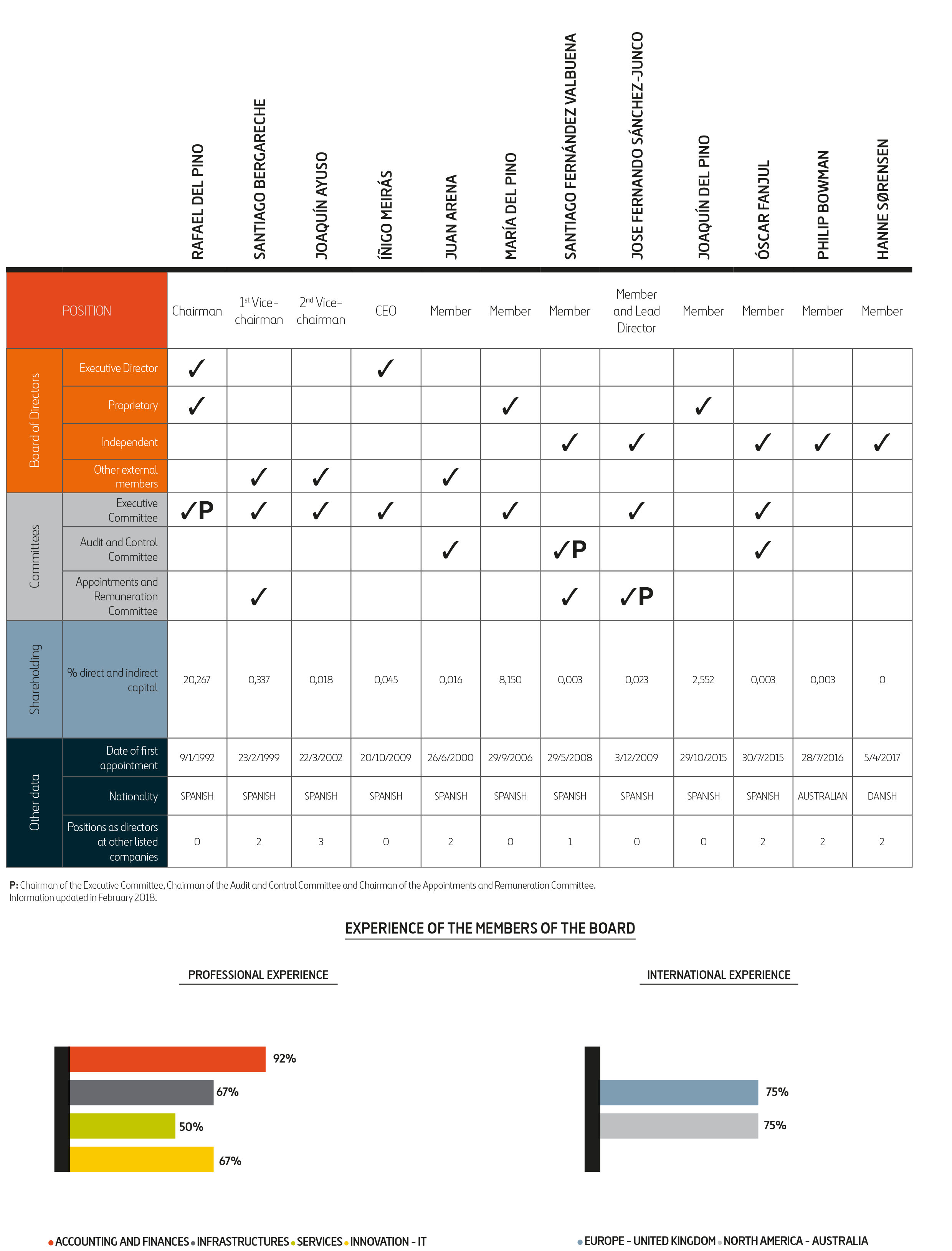Corporate Governance
FERROVIAL'S CORPORATE GOVERNANCE SEEKS TO GUARANTEE INTEGRITY, WHICH IS CONSTRUED AS DILIGENT, TRANSPARENT AND RESPONSIBLE CONDUCT VIS-À-VIS SHAREHOLDERS, EMPLOYEES, CLIENTS AND THE DIFFERENT AGENTS AFFECTED BY THE COMPANY'S ACTIVITIES. INTEGRITY IS KEY TO ENSURING PROFITABLE BUSINESS AND LONG-TERM SUSTAINABILITY IN LINE WITH THE COMPANY'S STRATEGY WHILE STRENGTHENING THE TRUST THAT SHAREHOLDERS AND THE DIFFERENT STAKEHOLDERS HAVE IN THE COMPANY
-
FEMALE BOARD REPRESENTATION
30 % BOARD OF 2020 -
EXTERNAL BOARD ASSESSMENT
3 CONSECUTIVE YEARS -
VOTING RIGHTS ASSIGNED TO THE BOARD OF DIRECTORS
31.5 % -
LEAD DIRECTOR
1 LEAD DIRECTOR
In compliance with commercial law, the Annual Corporate Governance Report (ACGR) forms part of this management report, and was drawn up by the Board of Directors and has been filed with the Spanish Securities Commission (CNMV). The ACGR details all corporate governance aspects at Ferrovial and is available at www.ferrovial.com.
As indicated in the ACGR, Ferrovial complies, in whole or in part, with the majority (56 of the 59 that are applicable) of the recommendations that apply to the Code of good governance of listed companies. In this sense, the company regularly analyzes the best practices and regulations of good governance in the national and international scope to assess their application and incorporation to its internal regulations.
GOVERNMENT BODIES
The ACGR details how the company’s management bodies and the decision-making process work, with emphasis on the roles of the Annual General Meetings and Board of Directors as the company’s most senior management bodies.
 Board of Directors
Board of Directors
The Board performs its duties with unity of purpose and independent judgment. It treats all shareholders in the same position equally, and works in the social interest, with the same understood to mean securing a profitable business that is sustainable in the long term, supporting its continuity and seeking optimal economic value for the company.
It consists of 12 members, facilitating an efficient and participative operation. Re-elections take place every three years, compared to the maximum of four prescribed by the company regulations. This enables shareholders to validate their management more frequently.
In 2017, the Board held a total of six sessions, with an average duration of 6 hours and 50 minutes per meeting and 100% attendance.
Executive Committee
This Committee has all delegated powers of the Board of Directors, except for powers that cannot be delegated for legal or statutory reasons. The committee comprises seven members. In addition to other duties, it monitors the performance of key business indicators and approves certain group operations.
Audit and Control Committee
It comprises three Non-Executive Directors, the majority of whom are independent, including the Chairman. All of them were appointed in consideration of their knowledge and experience in accounting, auditing or risk management.
The main duties, other than those attributed by law, are described below, representing the adoption of recommendations from the Good Governance Code for Listed Companies:
- Supervising the generation and presentation of mandatory financial information, and ensuring that the Board seeks to present accounts to the Annual General Meeting without any limitations or qualifications in the audit report.
- Be informed of the structural and corporate change operations planned by the Company, previously reported to the Board of Directors, on its economic conditions and accounting impact, particularly, if applicable, on the proposed exchange ratio.
- Ensuring that the company and the accounts auditor adhere to rules governing the provision of services other than auditing, limits on the concentration of auditor services and other general regulations concerning the independence of account auditors.
- Ensure that the remuneration of the auditor of accounts does not compromise quality or independence.
- Receiving regular information on activities from the Internal Audit Department.
- Ensuring the independence of the Internal Audit Department.
- Establishing and supervising a system that allows employees to confidentially and, if possible and deemed appropriate, anonymously report any irregularities with potentially serious implications that may be identified at Ferrovial, particularly regarding financial and accounting matters.
- Supervising compliance with internal corporate governance and conduct standards on securities markets, and proposing improvements.
- Coordinating the process for reporting non-financial information according to the applicable legislation and benchmark international standards.
The activities that the Committee carried out during the five sessions held in 2017 are detailed in the report regarding its operation, published on the Ferrovial website. The Audit and Control Committee takes into account the recommendations of the CNMV Technical Guide on Audit Committees for Public-Interest Entities in its activity and operation.
Appointments and Remuneration Committee
The Committee comprises three Non-Executive Directors, the majority of whom are independent, including the Chairman.
The main duties, other than those attributed by law, are described below, representing the adoption of recommendations from the Good Governance Code for Listed Companies:
- Proposing basic terms for senior management contracts.
- Ensuring that all non-executive directors have sufficient time to duly perform their duties.
- Ensuring compliance with the remuneration policy established by the company.
- Verifying information on remuneration for directors and senior management contained in the various corporate documents, including the Annual Board of Directors’ Remuneration Report.
- Ensuring that any conflicts of interest do not impair the independence of the advice provided to the Committee.
- Reporting on the appointment of the Chief Executive Officer and the members that should form part of each of the Committees, taking into account the knowledge, skills and experience of the Directors and the duties of each Committee.
The activities that the Committee carried out during the four sessions held in 2017 are detailed in the report regarding its operation, published on the Ferrovial website.
HANNE SØRENSEN, independent director
In 2017, the Annual General Meeting of Shareholders appointed Hanne Birgitte Breinbjerg Sørensen as Independent Director. This appointment reinforces the presence of Independent Directors, as well as the diversity of the gender, backgrounds and knowledge of the Board members, in compliance with the conclusions set forth in the Appointments and Remuneration Committee report on the needs of the Board’s composition.


